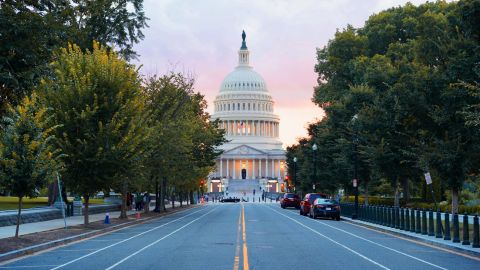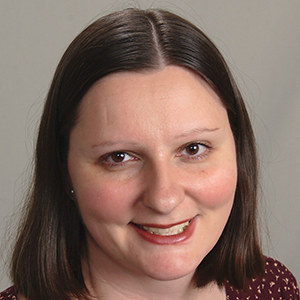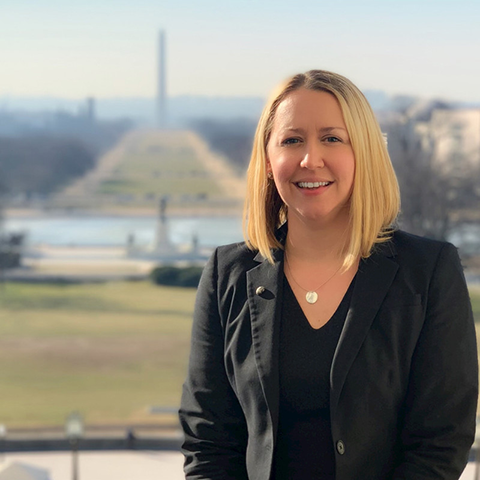Meet Meghan Mott
Meghan Mott is a believer in policy fellowships. She’s completed three of them herself.
Mott is today a professional staff member for the U.S. Senate Appropriations Committee. More specifically, she works for the subcommittee that provides funding for the Departments of Labor, Health and Human Services, Education, and related agencies.
She earned her Ph.D. in anatomical science and neurobiology in 2011 at the University of Louisville School of Medicine and went on to complete postdoctoral training at the National Institutes of Health. It was at the NIH that she became interested in a career in science policy.
“As a postdoc, I got involved in the intramural fellows community on campus at NIH, where I co-chaired the Career Development Committee. At the same time, I started writing for the Association for Women in Science magazine as a regular contributor and the NIH Record and NIH Catalyst newsletters,” Mott recalled. “By the end of my first year as a postdoc, I identified science policy as a career path and started applying for fellowships.”
In 2014, she was selected for the Christine Mirzayan Science & Technology Policy fellowship at the National Academies. She then did a quick stint as a research associate at the Institute of Medicine before participating in another program, the American Association for the Advancement of Science’s Science & Technology Policy Fellowship, which matched her to the National Institute of Neurological Disorders and Stroke.
“I was hired on as chief of staff after my fellowship ended. I stayed there for five years. During that time I also got married and had my first baby,” she said. “I learned a lot about the world of science administration and communication, helped build and coordinate high-profile projects like the BRAIN Initiative, and developed relationships across NIH, with other federal agencies, professional societies, advocacy groups and the scientific community. By the end of my fourth year at NINDS, I started to get the itch to do something different.”
It was at that point that she prepared to embark on her third and final fellowship, this one offered by the Brookings Institution.
“One facet of my job (at NINDS) that I really liked was coordinating our interactions with Congress. I discovered the Brookings LEGIS Fellowship program and was fortunate that I had an incredibly supportive boss who was willing to let me go work on Capitol Hill for a year,” she said.
Brookings placed Mott with the Senate Health, Education, Labor, and Pensions Committee working for U.S. Sen. Patty Murray, D-Wash., who was then the ranking member. Mott’s work focused on biomedical science and women’s and mental health issues.
“I was excited to work for Senator Murray,” Mott said. “I was inspired by her story of how she entered politics — after being told she couldn’t make a difference as ‘just a mom in tennis shoes’ while advocating for funding for her kids’ preschool program. She went on to become the first female senator from Washington state, the first female chair of the Senate Veterans’ Affairs and Senate Budget Committees and is now the third ranking Democrat in the Senate. Today that mom in tennis shoes is a champion for strong investments in community health centers, the healthcare workforce, biomedical research, health equity and public health infrastructure. As a woman and as a scientist, it’s a privilege for me to work for a leader in Congress who values science and fights for these causes.”
Soon enough, a staffer on the LHHS subcommittee retired, and Mott won her current spot.
Mott talked to ASBMB Today about her work and advice for others interested in careers in policy. The interview has been edited for length, clarity and style.
Tell us about your current role and what you enjoy most about it.
In a typical year, our work is fairly cyclical: The bill cycle kicks off with the release of the president’s budget in February, followed by agency budget hearings that we organize in March and April. During that time we also meet with various advocacy and special interest groups as well as constituents about issues in our agencies and proposed bill and report language.
My job entails a lot of writing, often under quick turnaround deadlines in response to emerging issues. It is also very outward facing, and there is an important social and political aspect to it, in that we negotiate draft legislation with our Republican and Democratic counterparts in the Senate and House of Representatives to come to an agreement before our bill is voted on on the House and Senate floor. There is definitely a science and an art to it.
Recently, COVID-19 put that process on steroids. To say that it’s been like building a plane while flying it is not an exaggeration, I think. But that’s what I like most about my job — that while there is this underlying cadence to our annual bill preparation, there is also this fast-paced, responsive component that is unpredictable and keeps you on your toes.
I’ve helped write these historic pieces of legislation that Congress enacted — like the CARES Act and the American Rescue Plan — that have provided direct relief to workers, families and schools. Our six supplemental bills have helped ramp up testing and sequencing to identify new COVID-19 variants and slow the spread of the virus. Most importantly, they have helped mount a national vaccination program to get shots in arms as fast as possible.
I’m very proud and humbled to have been a part of this impactful work that has touched so many lives over the last two years.
What skills should young women interested in science develop if they want to work in the field?
If you think you’re interested in policy as a potential career, do your homework. Seek out as many people as you can who are working in policy who are willing to talk to you about their job, what they like about it and what they don’t, and how they made their transition into the field.
As far as skills go, being a good writer who is able to convey and distill complex information in a concise manner is really key.
Demonstrating leadership and organizational abilities outside of the lab is also important for making the transition. Studying and understanding the ecosystem you’re trying to break into and gaining real experience working in it are also critical. For me that was through my initial detail as a postdoc and then a series of policy fellowships — of which there are many nowadays!
Enjoy reading ASBMB Today?
Become a member to receive the print edition four times a year and the digital edition monthly.
Learn moreFeatured jobs
from the ASBMB career center
Get the latest from ASBMB Today
Enter your email address, and we’ll send you a weekly email with recent articles, interviews and more.
Latest in Policy
Policy highlights or most popular articles

Hope for a cure hangs on research
Amid drastic proposed cuts to biomedical research, rare disease families like Hailey Adkisson’s fight for survival and hope. Without funding, science can’t “catch up” to help the patients who need it most.

Supporting science through advocacy and community building
ASBMB calls on scientists to take action as funding cuts and policy shifts threaten the U.S. research enterprise, emphasizing the power of community advocacy and persistence in protecting the future of science.

Seven steps to advocating in your home state
Find out how to schedule, prepare for and conduct a productive district office meeting to communicate the importance of fundamental scientific research funding to your representatives.

ASBMB members call for funding and agency support amidst uncertainty
In 60 meetings on Capitol Hill, scientists urge legislators to reaffirm support for scientific innovation

Embrace your neurodivergence and flourish in college
This guide offers practical advice on setting yourself up for success — learn how to leverage campus resources, work with professors and embrace your strengths.

ASBMB honors Lawrence Tabak with public service award
He will deliver prerecorded remarks at the 2025 ASBMB Annual Meeting in Chicago.


